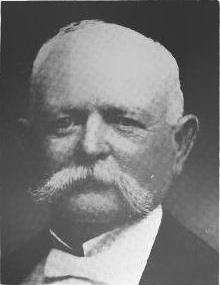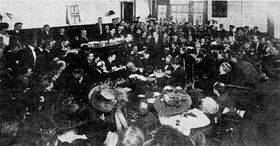Duncan Brown Cooper
Duncan Brown Cooper (April 21, 1844–November 4, 1922) was an American journalist, publisher and Democratic politician.[1] He served in both the Tennessee House of Representatives and in the Tennessee Senate.[1][2][3]
Duncan Brown Cooper | |
|---|---|
 Cooper, c. 1908 | |
| Born | April 21, 1844 Columbia, Tennessee, U.S. |
| Died | November 4, 1922 |
| Resting place | Zion Presbyterian Church |
| Occupation | Journalist, politician |
| Spouse(s) | Florence Fleming Mary Polk Jones |
| Children | 8 |
| Parent(s) | Matthew Delamere Cooper Marian Witherspoon Brown |
| Relatives | William Frierson Cooper (half-brother) Lucius E. Burch (brother-in-law) Lucius E. Burch, Jr. (nephew) |
In 1908 he became involved in a feud with a political opponent and newspaper competitor, Edward W. Carmack. Cooper warned Carmack that if his name appeared again in Carmack's newspaper, The Tennessean, he would retaliate. Cooper and his son did in fact retaliate after Carmack ignored the warning and continued to attack and satirize Cooper.
Carmack was shot and killed shortly thereafter. In the court case that followed Carmack's murder, Cooper and his son were convicted of second-degree murder, and Duncan Cooper was given a sentence of 20 years in prison. His son was granted a new trial on appeal, but the prosecution decided against pursuing the case.
Early life
He was born at "Mulberry Hill" near Columbia in Maury County, Tennessee in 1844.[1][3] His father was Matthew Delamere Cooper (1792–1878) and his mother, Marian Witherspoon (Brown) Cooper (1822–1861), was his father's third wife.[3] His half-brother was William Frierson Cooper (1820–1909), who became a member of the Tennessee Supreme Court and owned the Riverwood Mansion. His sister Sarah married Dr. Lucius Burch, a Dean of the Vanderbilt University School of Medicine. Their son, Lucius E. Burch, Jr., was his nephew.
Cooper attended Jefferson College in Canonsburg, Pennsylvania, now known as Washington & Jefferson College.[3]
Career

During the American Civil War of 1861–1865, Cooper fought in the Confederate States Army. He was captured at Fort Donelson in Tennessee.[1]
He returned to Nashville after the war and became involved in politics. After the Reconstruction era, Cooper was elected as a Democratic state representative in 1881 and state senator in 1895.[3] He was also the publisher of the Nashville American, a conservative Democratic daily newspaper.[1]
Cooper worked on the 1908 gubernatorial campaign of Malcolm R. Patterson, who was elected and served as Governor of Tennessee from 1907 to 1911.[1] Both Cooper and Patterson were opposed to prohibition.[1] Patterson's gubernatorial opponent, Edward W. Carmack, was the editor of The Tennessean. He grew embittered and published scathing articles about Cooper.[4]
On November 9, 1908, Cooper and his son Robin encountered Carmack on a Nashville street.[4] Out of fear, Carmack fired first on the father and son, wounding the son.[1] Robin Cooper retaliated, killing Carmack.[2][4][5] Some accounts suggested it was premeditated murder.[6][7]
During the first trial, both Cooper and his son Robin were convicted of second-degree murder and twenty years in prison.[5] Governor Patterson granted a pardon to Cooper and saved him from jail.[5] Shortly after, Robin was granted a second trial on appeal. He was released after the prosecutor decided not to retry the case.[5] However, he was still vilified in the temperance press and shunned by Nashvillians.[1][6] Governor Patterson found that he had doomed his political career by pardoning Cooper.[8]
Personal life
In 1865, Cooper married Florence Fleming (1843-1870), and they had three children together.[3] After her death, in the 1870s, he married again, to Mary Polk Jones (1856-1893). They had five children together.[3] In 1909 Cooper inherited Riverwood, his late brother's mansion.
Death
Cooper died in 1922.[9] He was buried in the cemetery of Zion Presbyterian Church in Columbia, Tennessee.[3]
Bibliography
- Summerville, James (1994). The Carmack-Cooper Shooting: Tennessee Politics Turns Violent, November 9, 1908. McFarland & Company. ISBN 9780786400126 – via Google Books.
References
- Ezzell, Timothy P. (December 25, 2009). "Duncan Brown Cooper". The Tennessee Encyclopedia of History and Culture.
- "COL. DUNCAN B. COOPER DIES; Death Recalls His Conviction for Slaying Former Tennessee Senator". The New York Times. November 5, 2002.
- "COOPER, DUNCAN BROWN (1844-1922) Papers" (PDF). Tennessee State Library and Archives. Archived from the original (PDF) on 2015-07-17. Retrieved 2013-04-03.
- Coker, Joe (2007). Liquor in the Land of the Lost Cause: Southern White Evangelicals and the Prohibition Movement. Lexington, Kentucky: University Press of Kentucky. p. 74 – via Google Books.
- Sheckler Finch, Jackie (2009). Insider's Guide to Nashville (7th ed.). Guilford, Connecticut: Globe Pequot Press. p. 8. ISBN 978-0-7627-4867-9 – via Google Books.
- Majors, William R. (1984). Editorial Wild Oats: Edward Ward Carmack and Tennessee Politics. Mercer University Press. pp. 147-148 – via Internet Archive.
duncan B. Cooper.
- Harper, William A. (1999). How You Played the Game: The Life of Grantland Rice. University of Missouri Press. p. 114 – via Internet Archive.
duncan B. Cooper.
- Ezzell, Timothy. "Malcolm R. Patterson". Tennessee Encyclopedia of History and Culture. Retrieved April 1, 2014.
- "Riverwood Mansion, History". Riverwood Mansion. Archived from the original on April 7, 2013. Retrieved April 3, 2013.